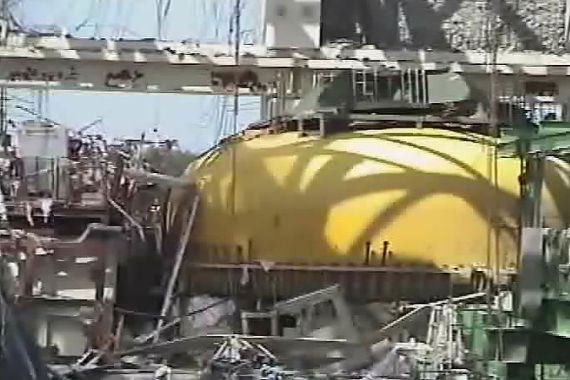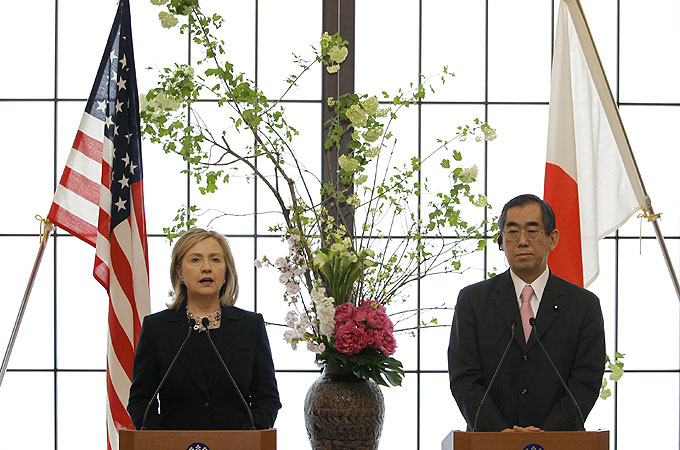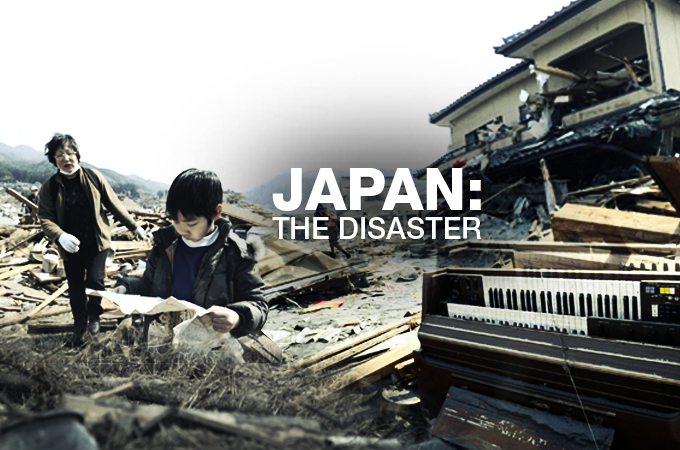Plant operator to ‘end’ Japan nuclear crisis
TEPCO, operator of radiation-leaking Fukushima facility, says it will control the situation within six to nine months.

 |
| Clinton [left] is the highest-ranking US official to visit Japan, a close ally, since the twin disasters [Reuters] |
The operator of the crippled Fukushima Daiichi nuclear power plant in Japan has announced a plan to bring the radiation crisis under control within six to nine months.
Tsunehisa Katsumata, the chairman of the Tokyo Electric Power Co. [TEPCO], told a news conference on Sunday that the company had come up with a phased roadmap for ending the crisis and allowing residents evacuated from the area around the plant to return home.
Keep reading
list of 4 itemsAfter the Hurricane
World’s coral reefs face global bleaching crisis
Why is Germany maintaining economic ties with China?
Officials said the plan involved covering the damaged reactor buildings to contain the radiation.
“We sincerely apologise for causing troubles,” Katsumata said.
 |
| Click here for more on our special coverage |
“We are doing our utmost to prevent the crisis from further worsening.”
Frustrations have been mounting over TEPCO’s failure to resolve the crisis, which began when a catastrophic earthquake and tsunami hit Japan last month, knocking out power and cooling systems at the nuclear complex located in the country’s northeastern coast.
In the first three months of the plan, the company hopes to steadily reduce the level of leaking radiation, Katsumata said.
Three to six months after that, it hopes to get the release of radioactive materials under control.
“We would like to see evacuees return to their homes as early as possible,” Katsumata said.
The company is focusing on cooling the reactors and spent fuel pools, decontaminating water that has been contaminated by radiation, mitigating the release of radiation into the atmosphere and soil, and measuring and reducing the amount of radiation affecting the evacuation area, TEPCO chairman said.
Sakae Muto, a TEPCO vice president, said that in addition to covering the reactor buildings, the company will also work with authorities to decontaminate areas affected by the radiation.
The announcement comes on a day when the radiation level increased drastically near Fukushima.
Al Jazeera’s Harry Fawcett, reporting from Tokyo, said, “We are hearing that radiation level in sea water off Fukushima is up sharply again; radioactive iodine is at 6000 times the level it should be, that’s a six fold increase in one day.”
Clinton visits Tokyo
Meanwhile, Hillary Clinton, the US secretary of state, arrived in Japan to show solidarity with the Japanese people as they struggle to recover from the twin disasters that killed thousands and triggered a nuclear crisis.
Clinton touched down in Tokyo on Sunday. She is expected to renew the Obama administration’s commitment to do its utmost to assist rebuilding efforts in the aftermath of the disaster that left more than 13,000 people dead and 14,000 missing.
“Economically, diplomatically and in so many other ways, Japan is indispensable to global problem-solving,” Clinton told a news conference after talks with Takeaki Matsumoto, the Japanese foreign minister.
“And the US-Japan alliance is as indispensable as ever to global security and progress.”
Clinton also said Japan and the United States had agreed to create a “public-private partnership for reconstruction” under the guidance of Japan’s government, and that US firms and organisations would begin discussing how they can support Japan as it comes through the crisis.
Since the disaster struck on March 11, a contingent of some 20,000 US forces have won praise for a large-scale search, rescue and relief effort.
In the US relief effort, helicopters have flown aid missions from an aircraft carrier, marines helped clear the tsunami-ravaged Sendai airport which reopened last week, and thousands joined a search of the coastline for bodies.
US nuclear experts have also helped with advice on stabilising the tsunami-hit Fukushima Daiichi nuclear plant, where the US military has flown in coolants and deployed fresh water barges and fire engines to help douse hot reactors.
Al Jazeera correspondent said: “It’s very much public show of solidarity and support for a key ally at such a difficult time. Also it’s an opportunity to talk again about how much help US military has helped in rescue operation.”